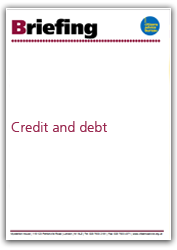Out of order

CAB evidence on the use of charging and orders for sale in debt collection
Introduction and summary
Citizens Advice is concerned about the growing use of charging orders by creditors. A charging order is a way of enforcing a previously unsecured debt by securing it against the debtor’s property. A creditor with a charging order can then apply to the court for an order for sale to recover the debt by forcing the sale of the property.
Since 2000 there has been a staggering 722 per cent increase in the number of charging order applications by unsecured creditors. Around 74 per cent of the 132,000 applications in 2007 resulted in charging orders being made.1
But CAB evidence shows that some creditors are using the threat of court action followed by a charging order to intimidate people in financial difficulties to pay more than they can reasonably afford. The growing ease with which creditors are obtaining charging orders is undermining good debt collection practices. It rewards lenders who will not accept reasonable repayment offers from people in financial difficulties who are doing everything they can to deal with their debt problems.
Moreover, bureaux are now reporting that creditors are asking the court to enforce charging orders by an order for sale. Although the instances of people losing their homes because of previously unsecured debts are rare, we are concerned that creditors are attempting to test the existing weak legal protections for debtors.
Fortunately, the Government will not now be going ahead with reforms that would make charging orders easier for creditors to get. But this also means that there will also be no review of the current safeguards for debtors. The experience of CAB debt clients suggests that the Government needs to set new and fairer enforcement thresholds that creditors must prove before taking enforcement action through the courts. Citizens Advice believes that this should be based on the principle that people in debt who are doing their best to repay their debts should be protected from further debt collection or enforcement action.
1. Ministry of Justice, Judicial Statistics, 2007

